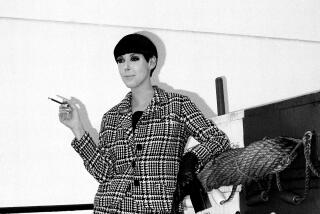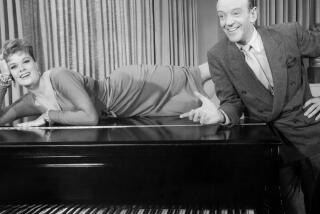Highs and lows of child star Baby Peggy
- Share via
By the time she was 2, Baby Peggy was one of the silent screen’s brightest lights. From 1921 to 1925, the bob-haired little girl starred in nine feature films and 150 shorts, earning up to $1 million a year.
By the time she was 6, her career was on the wane after her father had a financial dispute with producer Sol Lesser, making her a baby non grata in Hollywood.
Baby Peggy, who is known today as Diana Serra Cary, is a 92-year-old grandmother, silent film historian and respected author of several books about Hollywood including “Hollywood Posse” and “Whatever Happened to Baby Peggy?”
She’s one of the last living silent film performers, and on Saturday afternoon she’ll appear in person at the UCLA Film & Television Archive’s festival of preservation at the Billy Wilder Theater. “Baby Peggy: Hollywood’s Tiny Titan” will feature fragments from several of her films including 1922’s “Little Red Riding Hood” and 1923’s “The Darling of New York,” as well as her 1921 short, “Brownie’s Little Venus,” in which she starred with Brownie the Wonder Dog.
“She really embodied the apotheosis of the immigrants’ dream,” said film historian/documentarian David Stenn, who helped fund the restoration of all six “Baby Peggy” movies screening Saturday. “The plots of her films are very similar thematically — the plucky American girl who through a series of misadventures comes out in the end.
“To an audience of predominately illiterate or newly arrived residents of this country, she embodied the hopes and dreams that this could happen to them.”
Cary is more modest: “I was in the right place at the right time,” Cary said by phone from her home in the Bay Area during a recent interview.
But she does say with some pride that Baby Peggy “was sassy. I wasn’t Victorian curls and valentines. I was made for speed more than beauty.”
Her father, Jack Montgomery, had been a cowboy since the age of 13. “A dozen or so years later, he found himself jobless in the West that had begun to run on wheels,” Cary said. “But Hollywood was looking desperately for riders. So in 1920 he moved to Hollywood with myself, my sister and my mother.”
Cary was discovered at the age of 19 months. Her mother had taken her and her sister to the old Century Studio that was run by Julius Stern, the brother-in-law of Universal founder Carl Laemmle. “My mother wanted to go to a studio because my father was always talking about them,” recalled Cary.
“While I was there, this director who had been looking for a child to work with Brownie, saw me. He wanted a child small enough to work comfortably with Brownie. I had never seen a dog before so he scared me,” she said. “I started to cry.”
When her mother told her father about the incident, Cary says “he got mad. He said, she is not afraid of anything.” So he took her in to talk with Fred Fishback, the director who first spotted her. She walked out with an agreement to do one film at $7.50 a day, the same amount her father was making doubling for cowboy star Tom Mix.
By the age of 2, Baby Peggy was being groomed for stardom. “They worked me all around the lot for a year.” Then in 1922 she was teamed with director Alfred J. Goulding.
“He was a director from Australia,” she said. “He had been a child actor. No wonder I loved him. He had all kinds of knowledge about how to work with children. In one film, I played a reporter and he said you are going to have to wear a monocle in one eye and you have to learn how to wear it. It was quite a trick. He worked so patiently with me. That year we worked together we turned out the best comedies.”
As Baby Peggy’s star and income rose, her parents spent money as fast as she was making it.
“They had a house in Beverly Hills before I was 3,” she said. “Then we had a house in Laurel Canyon. Then we had a Duisenberg car that was $30,000. I was making a lot of money. My films were circulated over the globe and I had piles of fan mail.
“But they thought Hollywood was forever. My parents had no plan for adulthood for my sister and myself. We weren’t sent to school. We didn’t have a tutor. We simply grew up and worked. We had no education at all. I did have the good luck to have one tutor.”
But Baby Peggy was shunned by Hollywood after her father developed money issues with the producer. “I could never get picked up for more than just bit parts,” she said. “I never found anybody on the set who wasn’t good to me. They couldn’t deal with any parents who locked horns with producers.”
The family’s wealth vanished quickly. While she was on the road with her family doing a vaudeville act as Baby Peggy, her father’s stepfather, who was involved with her production company, wiped them out. “He took all the china, silverware and he went to the bank and withdrew all the money. We were destitute and nobody could give me job.”
Baby Peggy, said Cary, destroyed her family. “The whole family was upside down. My family never discussed Baby Peggy again. I could never be important to my father again after I became ‘me.’ My father had this feeling that I disappeared. It was as if somebody died.”
More to Read
The biggest entertainment stories
Get our big stories about Hollywood, film, television, music, arts, culture and more right in your inbox as soon as they publish.
You may occasionally receive promotional content from the Los Angeles Times.











